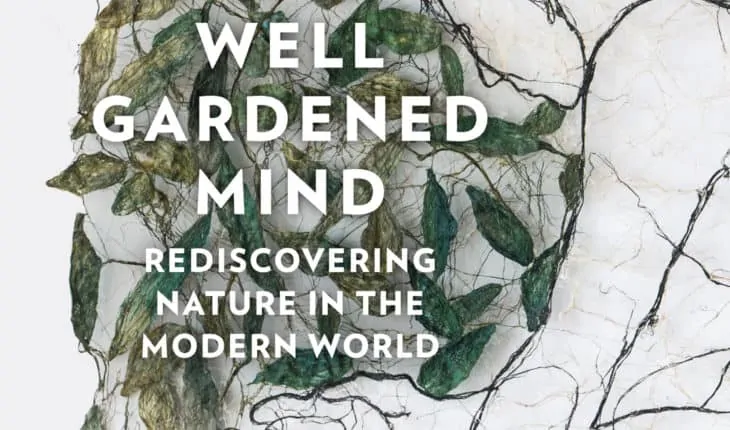In her new book, ‘The Well Gardened Mind’ psychiatrist Sue Stuart-Smith explores how gardening is good for the mind and body and can ease the stress of your hospital job.
Spending time in the garden, pottering and listening to birdsong is beneficial for our physical and mental health, a new study has found. Professor Alistair Griffiths, director of Science at the Royal Horticultural Society and co-author of the study published in the journal Landscape and Urban Planning, said, “This work adds to the increasing body of scientific evidence on the health benefits of gardens and gardening.” The team of scientists analysed data collected from nearly 8,000 participants between 2009 and 2016 and found that those who spent time in the garden were far more likely to report good physical and mental health than those who did not. Dr Sian de Bell, of Exeter University Medical School and the lead author of the study said, “A growing body of evidence points to the health and wellbeing benefits of access to green or coastal spaces. Our study is one of the largest to date to look at the benefits of gardens and gardening specifically.”
In her new book ‘The Well Gardened Mind’ psychiatrist and psychotherapist Sue Stuart Smith explores how the life-affirming pleasures of tending a plot, or garden can re-connect people to nature and our ancient sense of connection with the land. The fast and unrelenting pace of urban life with its smart technology have meant that we have become increasingly disconnected with nature and the slower rhythms of the natural world.
The book is inspired partly by Stuart-Smith’s grandfather Ted, who served as a submariner in the First World War and was taken prisoner after his submarine ran aground in 1915. He escaped from a prisoner-of-war camp in 1918, somehow making the 4,000 mile trip back to England. When he arrived home he was starving, had lost his hair and his mind disarrayed. Stuart-Smith writes that her grandfather’s recovery was helped by taking a horticultural course which sparked his lifetime’s passion for gardening and a love of rare orchids. Other incredibly inventive soldiers managed to garden even during the war. Some of the dugouts near the river Somme had little gardens with shrubs and roses, with flowerpots creatively made from spent shell-casings.
For Stuart-Smith, a garden – such as her own in Hertfordshire can provide a quiet mental space “so you can hear your thoughts”. When you work in your garden, weeding, watering, mowing or clipping you free your mind to work through your emotions and problems. A garden can become an oasis to protect our sanity when things get tough.
Her case studies in her book include the HighGround project for recovering soldiers at the MoD garden in Headley Court in Surrey. She argues for bringing back green spaces into housing developments and encouraging community gardening projects.
She writes about the psychoanalyst Carl Jung who believed that modern technological life has alienated us from the earth and the rhythms of the seasons. Jung said, “We all need nourishment for our psyche. It is impossible to find such nourishment in urban tenements without a patch of green or a blossoming tree.” He grew his own vegetables and believed that every person should have a plot of land to reconnect them to the natural world.
Jung’s rival, Sigmund Freud was a keen orchid lover and cherished his garden in Hampstead, North London. Before he fled to England, he had enjoyed searching for rare wild flowers, whist holidaying in the Alps.
In 1859, Florence Nightingale wrote that when she had been ill, her recovery was greatly helped by “a nosegay of wildflowers” and she encouraged recuperating patients to sit by a window overlooking a garden, watching butterflies flit around.
Birdsong soothes the mind
As Summer approaches, the fall-off in traffic in towns and cities means suddenly we open our windows and hear the birds sing louder than ever. Listening to birdsong makes it possible to forget human problems for a few valuable moments and helps lower stress levels, anxiety and depression. Some of the most relaxing birds to listen to are blackbirds, robins, Blue tits, Mallards, Goldfinches, Nightingales and Wrens. Notice the activity in your garden – the energy, application and attention birds apply to build a nest are a delight to watch. Twigs are collected to create the framework, then beakfuls of earth, used as cement and finally any moss which can be found gives the nest a soft lining. Getting a bird feeder can attract songbirds to your garden, or terrace and help boost song bird numbers which has been declining sharply in recent years.
Live Longer
Elderly people who garden live longer and have a better quality of life. However, gardening is no longer the preserve of the older generation. Gardeners’ Question Time has a cult following among younger people as does #wildflowerhour on Twitter. Now that overseas holidays seem to be less attainable to all age groups, gardens and parks are more important than ever.
This stylishly written book is filled with insights into the therapeutic benefits of gardening can offer everyone. As well as boosting your mood and self-esteem, gardening immerses us in nature’s beauty and the eternal cycle of the seasons, of life, death and rebirth. Gardening has been one of the few beneficiaries of the lockdown, with a 128 per cent increase in sales of bulbs and seeds reported last month and farm shops selling out of parsley and basil plants. In this uncertain time, planting, weeding, sitting and strolling in gardens can refresh us and bring our instincts back to life again.
The Well Gardened Mind: Rediscovering Nature in the Modern World by Sue Stuart-Smith, published by William Collins, price £20, ebook £12.99p
https://www.songbird-survival.org.uk/
- Dream Worlds a new exhibition in Cambridge - 14th December 2024
- “All Our Stories” a major new exhibition - 26th September 2024
- Dance yourself well - 23rd June 2024






